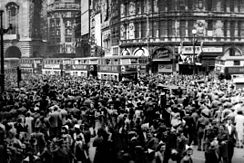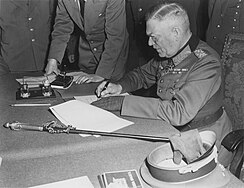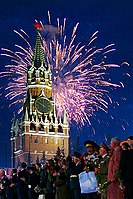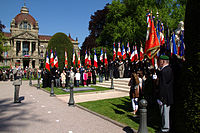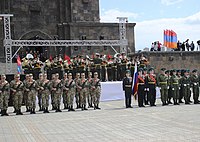Victory in Europe Day
| Victory in Europe Day | |
|---|---|
 Winston Churchill waving to the crowds in Whitehall on 8 May celebrating the end of the war, showing the V of Victory | |
| Also called |
|
| Observed by | European states
|
| Type | International |
| Significance | End of World War II in Europe |
| Date | 8 May |
| Frequency | Annual |
| First time | 8 May 1945 |
| Related to | Victory over Japan Day, Victory Day (9 May) and Europe Day |
Victory in Europe Day is the day celebrating the formal acceptance by the Allies of World War II of Germany's unconditional surrender of its armed forces on Tuesday, 8 May 1945; it marked the official end of World War II in Europe in the Eastern Front, with the last known shots fired on 11 May.
Russia and some former Soviet countries celebrate on 9 May, as Germany's unconditional surrender entered into force at 23:01 on 8 May Central European Summer Time; this corresponded with 00:01 on 9 May in Moscow Time.
Several countries observe public holidays on the day each year, also called Victory Over Fascism Day, Liberation Day, or Victory Day. In the UK it is often abbreviated to VE Day, a term which existed as early as September 1944,[1] in anticipation of victory.
History
[edit]Adolf Hitler, the Nazi leader, had committed suicide on 30 April during the Battle of Berlin, and Germany's surrender was authorised by his successor, Reichspräsident Karl Dönitz. The administration headed by Dönitz was known as the Flensburg Government. The act of military surrender was first signed at 02:41 on 7 May in SHAEF HQ at Reims,[2] and a slightly modified document, considered the definitive German Instrument of Surrender, was signed on 8 May 1945 in Karlshorst, Berlin at 22:43 local time.
The German High Command will at once issue orders to all German military, naval and air authorities and to all forces under German control to cease active operations at 23.01 hours Central European time on 8 May 1945...
— German Instrument of Surrender, Article 2, [citation needed]
Upon the defeat of Germany, celebrations erupted throughout the Western world, especially in the United Kingdom, in North America and in USSR. More than one million people celebrated in the streets throughout the UK to mark the end of the European part of the war. In London, crowds massed in Trafalgar Square and up the Mall to Buckingham Palace, where King George VI and Queen Elizabeth, accompanied by their daughters and Prime Minister Winston Churchill, appeared on the balcony of the palace before the cheering crowds. Churchill went from the palace to Whitehall, where he addressed another large crowd:[3]
God bless you all. This is your victory. In our long history, we have never seen a greater day than this. Everyone, man or woman, has done their best.


Churchill asked Ernest Bevin to come forward and share the applause. Bevin said, "No, Winston, this is your day", and proceeded to conduct the people in the singing of "For He's a Jolly Good Fellow".[3] Later, Princess Elizabeth (the future Queen Elizabeth II) and her sister Princess Margaret were allowed to wander incognito among the crowds and take part in the celebrations.[4] The 2015 film A Royal Night Out was inspired by Elizabeth and Margaret mingling with the public that night.[citation needed]
In the United States, the event coincided with President Harry S. Truman's 61st birthday.[5] He dedicated the victory to the memory of his predecessor, Franklin D. Roosevelt, who had died of a cerebral hemorrhage less than a month earlier, on 12 April.[6] Flags remained at half-staff for the remainder of the 30-day mourning period.[7][8] Truman said of dedicating the victory to Roosevelt's memory and keeping the flags at half-staff that his only wish was "that Franklin D. Roosevelt had lived to witness this day".[6] Later that day, Truman said that the victory made it his most enjoyable birthday.[5] Great celebrations took place in many American cities, especially in New York's Times Square.[9]
Tempering the jubilation somewhat, both Churchill and Truman pointed out that the war against Japan had not yet been won. In his radio broadcast at 15:00 on 8 May, Churchill told the British people, "We may allow ourselves a brief period of rejoicing (as Japan) remains unsubdued".[10][11] In America, Truman broadcast at 09:00 and said it was "a victory only half won".[12]
On the same day in 1945, Muslims in French Algeria celebrating the end of the war (of which some were also peacefully protesting for independence) became the targets of violence and massacres by colonial authorities and pied-noir settler militias, which would last until 26 June 1945.[13][14][15] While details of the killings were largely overlooked in metropolitan France, the impact on the Algerian Muslim population was traumatic, especially on the large numbers of Muslim soldiers in the French Army who were then returning from the war in Europe.[16] Nine years later, the Algerian War began, leading to independence from France in March 1962.[17] In February 2005, Hubert Colin de Verdière, France's ambassador to Algeria, formally apologized for the massacre, calling it an "inexcusable tragedy".[18][19]
National celebrations
[edit]VE Day is celebrated across European nations as public holidays and national observances.
Austria
[edit]The Festival of Joy is an Austrian event held in honor of VE Day. The Austrian Mauthausen Committee (MKÖ) has organised the Festival of Joy since 2013, in cooperation with the Austrian Government and the City of Vienna. The festival is held annually on Heldenplatz.[20]
On the eve of the diamond jubilee in 2020, Russian President Vladimir Putin, at the request of Chancellor Sebastian Kurz, gave a live address broadcast on Austrian TV channel ORF.[21]
France
[edit]France celebrates VE Day on 8 May, being a national and public holiday. Orléans simultaneously celebrates both VE Day and the anniversary of the Siege of Orléans being lifted on this date by French forces led by Joan of Arc during the Hundred Years War.[22]
Germany
[edit]Events in Berlin occur on 8 May to commemorate those who fought against Nazism in the German Resistance and died in World War II. In 2020, a regional holiday in Berlin occurred on 8 May to mark the 75th anniversary of surrender.[23] East Germany celebrated 8 May as its Tag der Befreiung (Liberation Day), first celebrated under Walter Ulbricht's government in 1950 and repeated annually until the fall of communism.[24] Between 1975 and 1990, it was Tag des Sieges (Victory Day).[citation needed]
Poland
[edit]8 May is known in Poland as "Narodowy Dzień Zwycięstwa" (National Victory Day). Poland officially recognised 9 May from 1945 until 2014, and on 24 April 2015, Poland officially recognised National Victory Day.[25] On 8 May 1945, a meeting of the Council of Ministers was held, debating whether to establish the holiday on 8 May (proposed by Marshal Michał Rola-Żymierski) or 10 May (proposed by the government).[26] Finally, in Poland, the National Day of Victory and Freedom was established on 9 May by decree.
From 1946 to 1989, it was celebrated with Russian traditions, as Poland was a socialist state at the time. The main celebrations were carried out at Plac Zwycięstwa or Plac Defilad in Warsaw (most notably in 1985).
After 1990 and the fall of the Soviet Union, no official ceremonies were organized; however, many cities and military units together with local governments organized their own festivities. The Russian minority in Poland continues to celebrate 9 May traditions to this date. At the end of March 2015, due to the upcoming 70th anniversary of the end of World War II in Europe, the President of the Institute of National Remembrance Łukasz Kamiński sent a letter to the Marshal of the Sejm requesting a change from 9 to 8 May.[27] On 24 April, the Sejm adopted the Act on National Victory Day to be celebrated on 8 May, at the same time abolishing the National Day of Victory and Freedom celebrated on 9 May.[28]
United Kingdom
[edit]In the United Kingdom, VE Day is not an annual public holiday. In 1995 and 2020, the bank holiday was moved from the preceding Monday to 8 May to commemorate the 50th and 75th anniversaries of VE Day, respectively.[29][30]
Commemorative events
[edit] Belgium: In Belgium, the commemoration of the termination of World War II since 1974 has been part of the Armistice of 11 November 1918 (Dutch: Wapenstilstandsdag), an annual national holiday. Every year on this day, a truce-ceremony is held in the presence of the king at the Tomb of the Unknown Soldier near the Congress Column in Brussels. It was first intended to commemorate the victims of the First World War and subsequently those of World War II and all other wars worldwide.[citation needed]
Belgium: In Belgium, the commemoration of the termination of World War II since 1974 has been part of the Armistice of 11 November 1918 (Dutch: Wapenstilstandsdag), an annual national holiday. Every year on this day, a truce-ceremony is held in the presence of the king at the Tomb of the Unknown Soldier near the Congress Column in Brussels. It was first intended to commemorate the victims of the First World War and subsequently those of World War II and all other wars worldwide.[citation needed] Czech Republic: Since the Dissolution of Czechoslovakia in 1993, the Czech Republic has officially recognized 8 May as Victory Day (Den vítězství) Liberation Day (Den osvobození).[31][32] In recent years the liberation of Plzeň by American forces has been commemorated on 5 May.[33][34][35] From 1948 to 1993, the Czechoslovak Republic celebrated 9 May, which was marked with a military parade of the Czechoslovak People's Army (ČSLA) on Letná every five years.[36][37]
Czech Republic: Since the Dissolution of Czechoslovakia in 1993, the Czech Republic has officially recognized 8 May as Victory Day (Den vítězství) Liberation Day (Den osvobození).[31][32] In recent years the liberation of Plzeň by American forces has been commemorated on 5 May.[33][34][35] From 1948 to 1993, the Czechoslovak Republic celebrated 9 May, which was marked with a military parade of the Czechoslovak People's Army (ČSLA) on Letná every five years.[36][37] European Union: 9 May is Europe Day which celebrates "peace and unity in Europe", on the anniversary of the 1950 Schuman Declaration.[38]
European Union: 9 May is Europe Day which celebrates "peace and unity in Europe", on the anniversary of the 1950 Schuman Declaration.[38]

 Baltic states: Estonia, Latvia and Lithuania officially commemorate 8 May, but do not commemorate 9 May since it marked the Soviet occupation in 1944 for these states.[39] Despite this, the local Russian communities still informally celebrate 9 May. Russian diplomats, other representatives from the Commonwealth of Independent States, and local politicians of Russian origin usually take part.[40][41]
Baltic states: Estonia, Latvia and Lithuania officially commemorate 8 May, but do not commemorate 9 May since it marked the Soviet occupation in 1944 for these states.[39] Despite this, the local Russian communities still informally celebrate 9 May. Russian diplomats, other representatives from the Commonwealth of Independent States, and local politicians of Russian origin usually take part.[40][41]
List of associated holidays
[edit]| Country | Holiday name | Date | Type | Notes |
|---|---|---|---|---|
| Victory and Peace Day | 9 May | National public | [42] | |
| Shushi Liberation Day | 8 May | National public | It is celebrated jointly with VE Day | |
| Victory Day | 9 May | National public | [42] | |
| Liberation Day, Guernsey | 9 May | Regional public | British Channel Islands have three Liberation Days: 9 May in Jersey and Guernsey;[43] 10 May in Sark;[44] and 16 May in Alderney | |
| Liberation Day, Sark | 10 May | Regional public | [44] | |
| Liberation Day, Alderney | 16 May | Regional public | [43] | |
| Victory Day | 9 May | National public | [45] | |
| Victory Day | 9 May | Regional public | Public holiday only in Republika Srpska but celebrated across the nation[46] | |
| Victory Day | 8 May | National public | as "Den vítězství" | |
| Remembrance Day | 8 May | National commemorative | Not a public holiday; commemorative services are held during the day.[47] | |
| Victory over Fascism Day | 9 May | National public | As "ფაშიზმზე გამარჯვების დღე" (Victory over Fascism Day)[48][49] | |
| VE Day | 9 May | National commemorative | Considered a national day of remembrance.[50] | |
| Liberation Day | 25 April | National public | Public holiday.[51] | |
| Liberation Day | 9 May | Regional public | [52] | |
| Victory Day | 9 May | National public | [53] | |
| Victory Day | 9 May | National public | [42] | |
| Remembrance Day | 8 May | National commemorative | As Nacisma sagrāves un Otrā pasaules kara upuru piemiņas diena (The Crushing of Nazism and Commemoration Day of Victims of World War II). Not a public holiday; commemorative services are held during the day.[54] | |
| Remembrance Day | 8 May | National commemorative | As Antrojo pasaulinio karo aukų atminimo diena (Day of Remembrance of the Victims of the World War II).[55] Not a public holiday; commemorative services are held by the President and other officials. | |
| Victory Day | 9 May | National public | [42][56] | |
| Liberation Day | 5 May | National commemorative | as "Bevrijdingsdag" (Liberation Day), a public holiday held once every year on 5 May.[57] | |
| Liberation Day | 5 May | National commemorative | as "Befrielsesdag" (Liberation Day), an official flag flying day, not a public holiday.[58] | |
| Liberation Day | 8 May | National commemorative | as "Frigjøringsdagen" (Liberation Day) and The National Veterans Day, an official flag flying day, not a public holiday.[59] | |
| Victory Day | 9 May | National public | as "День Победы" (Victory Day)[60][61] | |
| Victory Day | 9 May | National public | as "Дан победе" / "Dan pobede" (Victory Day), a public working holiday.[62][63] | |
| Victory over Fascism Day | 8 May | National public | as "Deň víťazstva nad fašizmom" [64] | |
| Victory Day | 9 May | National public | [42] | |
| Day of Remembrance of National Heroes of Turkmenistan in the 1941–1945 World War | 9 May | National public | [65] | |
| Day of Remembrance and Victory over Nazism in World War II 1939 – 1945 | 8 May | National public | [66] | |
| Day of Remembrance and Honour | 9 May | National public | [67] Known as "День Памяти и Почестей"; before 1999, it was known as "Галаба куни" or "День победы" (Victory Day).[citation needed] |
Soviet Victory Day
[edit]The instrument of surrender signed 7 May 1945 stipulated that all hostilities must cease at 23:01 (CET), 8 May 1945. Since that point in time would be on 9 May in local time in the Soviet Union, most Soviet states including Russia celebrated Victory Day on 9 May.[68][69]
Gallery
[edit]-
Fireworks in Moscow, Russia (Victory Day 2005)
-
Ceremony in Place de la République, Strasbourg, France (2013)
-
Concert in Amsterdam, Netherlands (Bevrijdingsdag 2014)
-
A street in Wetherby with decorative bunting, United Kingdom (2020)
-
Ceremony at the World War II Memorial, Washington D.C., United States (2020)
See also
[edit]- List of timelines of World War II
- Time of Remembrance and Reconciliation for Those Who Lost Their Lives during the Second World War
- Victory Day
- Victory Day Parades
- Victory over Japan Day
- Stunde Null
References
[edit]- ^ Harper, Douglas. "VE Day". Online Etymology Dictionary. Retrieved 12 March 2016.
- ^ Hamilton, Charles (1996). Leaders & Personalities of the Third Reich, Vol. 2. San Jose, CA: R. James Bender Publishing. pp. 285, 286. ISBN 978-0-912138-66-4.
- ^ a b Hermiston 2016, p. 355.
- ^ Barr, Sabrina (8 May 2020). "How Princess Elizabeth celebrated VE Day". The Independent. Archived from the original on 17 August 2022. Retrieved 11 May 2020.
- ^ a b "Truman Marks Birthday". The New York Times. 9 May 1945. p. 6.
- ^ a b "Victory Wreath From Truman Is Laid On Hyde Park Grave of War President". New York Times. Associated Press. 9 May 1945. p. 15.
- ^ "Army Extends Mourning Period". New York Times. Associated Press. 12 May 1945. p. 13.
- ^ United Press (15 May 1945). "30 Days of Mourning For Roosevelt Ended". New York Times. p. 4.
- ^ Telfer 2015, p. 75.
- ^ Telfer 2015, p. 33.
- ^ Hermiston 2016, p. 356.
- ^ Telfer 2015, p. 76.
- ^ Morgan, Ted (31 January 2006). My Battle of Algiers. HarperCollins. p. 17. ISBN 978-0-06-085224-5.
- ^ Horne, Alistair (1977). A Savage War of Peace: Algeria 1954–1962. New York: The Viking Press. p. 26.
- ^ Peyroulou, Jean-Pierre (2009). "6. La mise en place d'un ordre subversif, le 9 mai 1945". Guelma, 1945 : une subversion française dans l'Algérie coloniale. Paris: Éditions La Découverte. ISBN 9782707154644. OCLC 436981240.
- ^ Porch, Douglas (1991). The French Foreign Legion. Macmillan. p. 569. ISBN 978-0-333-58500-9.
- ^ Edgar O'Ballance, pages 39 and 195 "The Algerian Insurrection 1954–62", Faber and Faber London 1867
- ^ "Algeria Marks WWII Anniversary with Call for French Apology". VOA News. 9 May 2005. Archived from the original on 11 May 2005. Retrieved 8 May 2016.
- ^ "France urged to admit 1945 massacre". Al Jazeera. 8 May 2005.
- ^ "Organizer | Festival of Joy | Day of liberation 8 May". www.festderfreude.at. Retrieved 8 May 2023.
- ^ "Putin: Russia grateful to Austria for careful treatment of wartime burial sites". TASS. 8 May 2020. Retrieved 8 May 2023.
- ^ Marine, Protais (8 May 2021). France Bleu Orléans (ed.). "8 mai : le retour de la messe en l'honneur de Jeanne d'Arc à Orléans, malgré les polémiques" (in French). Retrieved 26 May 2021.
- ^ Schereck, Sabine (8 May 2020). "Berlin marks end of WW2 with unprecedented holiday". BBC News. Retrieved 8 May 2020.
- ^ "May 8, 1945: Total defeat or day of liberation? | DW | 5 May 2020". Deutsche Welle (www.dw.com). Retrieved 8 May 2020.
- ^ "Mamy nowe święto państwowe. Po raz pierwszy obchodzimy Narodowy Dzień Zwycięstwa". TVN24.pl. Retrieved 6 May 2019.
- ^ "Jak Moskwa narzuciła nam 9 maja jako Dzień Zwycięstwa i jak świętowaliśmy ten dzień tuż po wojnie | Szczęść Boże Stalinowi – strona 1 – Polityka.pl" (in Polish). www.polityka.pl. 9 May 2015. Retrieved 22 November 2017.
- ^ "Informacja o działalności Instytutu Pamięci Narodowej Komisji Ścigania Zbrodni przeciwko Narodowi Polskiemu w okresie 1 stycznia 2015 r. – 31 grudnia 2015 r., Warszawa 2016, s. 107 i 109" (PDF) (in Polish). Retrieved 7 May 2018.
- ^ "Ustawa z dnia 24 kwietnia 2015 r. o ustanowieniu Narodowego Dnia Zwycięstwa". isap.sejm.gov.pl.
- ^ Bowman, Verity; Hayes, Georgina (8 May 2020). "VE Day 2020: Britons celebrate 75th anniversary of Victory in Europe Day". The Telegraph – via www.telegraph.co.uk.
- ^ "2020 May bank holiday will be moved to mark 75th anniversary of VE Day". GOV.UK. 7 June 2019. Retrieved 8 June 2019.
- ^ "8. květen – Den vítězství | Svátky Centrum.cz". svatky.centrum.cz. Retrieved 7 May 2020.
- ^ "National Holidays in Czech Republic in 2020". Office Holidays. January 2020. Retrieved 7 May 2020.
- ^ "World War II Liberation Commemorations Culminate in Pilsen| U.S. Embassy in The Czech Republic". U.S. Embassy in The Czech Republic. 7 May 2016. Retrieved 5 May 2020.
- ^ Morning, Prague (5 May 2019). "Czechs Commemorate Anniversary of Prague Uprising". Prague Morning. Retrieved 5 May 2020.
- ^ DK Eyewitness Travel Guide: Czech and Slovak Republics: Czech and Slovak Republics. Penguin. 2013. p. 28. ISBN 978-1-4654-1265-2.
- ^ "Praha zažila vojenskou přehlídku, po 23 letech | Domov". Lidovky.cz (in Czech). 28 October 2008. Retrieved 15 July 2019.
- ^ "Prahou má burácet velkolepá vojenská přehlídka". Novinky.cz. 21 September 2016. Retrieved 15 July 2019.
- ^ Anonymous (16 June 2016). "Europe Day". European Union. Retrieved 8 May 2020.
- ^ "Baltic ambassadors snub Moscow victory day event". LRT. 10 May 2021. Retrieved 5 May 2022.
- ^ "Thousands mark Soviet Victory Day in Riga". Public Broadcasting of Latvia. 9 May 2015. Retrieved 9 May 2015.
- ^ "Crowds mark Soviet 'Victory Day' in Rīga". Public Broadcasting of Latvia. 9 May 2018. Retrieved 9 May 2018.
- ^ a b c d e "Victory Day around the world in 2020". Office Holidays. Retrieved 7 May 2020.
- ^ a b "The History of Liberation Day in Guernsey". www.visitguernsey.com.
- ^ a b "Sark celebrates Liberation Day". ITV News. 10 May 2019.
- ^ "National Holidays, Belarus | Belarus.by". www.belarus.by. Retrieved 7 May 2020.
- ^ "Bosnia and Herzegovina Public Holidays 2019". PublicHolidays.eu. Retrieved 7 May 2020.
- ^ "Statement by the Government of the Republic of Estonia". Government of the Republic of Estonia.
- ^ "9 მაისი, როგორც ფაშიზმზე გამარჯვების დღე, საქართველოშიც აღინიშნა". რადიო თავისუფლება (in Georgian). 9 May 2003. Retrieved 7 May 2020.
- ^ "National Holidays in Georgia in 2020". Office Holidays. January 2020. Retrieved 7 May 2020.
- ^ "Knesset Creates Victory in Europe Day". Knesset. Retrieved 12 May 2019.
- ^ "Governo Italiano – Dipartimento per il Cerimoniale dello Stato". Italian Government. Retrieved 10 May 2021.
- ^ Jersey, States of. "Government of Jersey". gov.je.
- ^ "National Holidays in Kazakhstan in 2020". Office Holidays. January 2020. Retrieved 7 May 2020.
- ^ "Latvia's National holidays and Remembrance days – MFA of Latvia". www.mfa.gov.lv. Archived from the original on 17 November 2016.
- ^ "Memorable dates and anniversaries – Genocid.lt".
- ^ "Europe Day around the world in 2020". Office Holidays. Retrieved 8 May 2020.
- ^ Bevrijdingsdag 5 mei www.rijksoverheid.nl (in Dutch)
- ^ Befrielsen danmarkshistorien.dk (in Danish)
- ^ Frigjøringen Store norske leksikon (in Norwegian)
- ^ "National Holidays in Russia in 2020". Office Holidays. January 2020. Retrieved 7 May 2020.
- ^ "Победа! 75 лет – официальный сайт". www.may9.ru. Retrieved 7 May 2020.
- ^ "Europe Day in Serbia in 2020". Office Holidays. Retrieved 7 May 2020.
- ^ "National and religious holidays in Serbia". www.minrzs.gov.rs (in Serbian). Retrieved 30 April 2022.
- ^ "National Holidays in Slovakia in 2020". Office Holidays. January 2020. Retrieved 7 May 2020.
- ^ "TURKMENISTAN MARKS DAY OF REMEMBRANCE OF THE FALLEN IN WORLD WAR II | Turkmenistan.ru". www.turkmenistan.ru. Archived from the original on 9 July 2021. Retrieved 13 June 2020.
- ^ "Rada adopts law on Day of Remembrance, Victory over Nazism in Second World War". Interfax-Ukraine. Retrieved 29 May 2023.
- ^ "Memorial Day in Uzbekistan in 2020". Office Holidays. Retrieved 8 May 2020.
- ^ Earl F. Ziemke, 1990, Washington DC, CENTER OF MILITARY HISTORY, CHAPTER XV:The Victory Sealed Page 258 last 2 paragraphs
- ^ Parfitt, Tom (9 May 2015). "Russia's Victory Day Parade marks new East-West divide". The Daily Telegraph. Retrieved 9 May 2016.
Bibliography
[edit]- Hermiston, Roger (2016). All Behind You, Winston – Churchill's Great Coalition, 1940–45. London: Aurum Press. ISBN 978-17-81316-64-1.
- Telfer, Kevin (2015). The Summer of '45. Islington: Aurum Press Ltd. ISBN 978-17-81314-35-7.
External links
[edit]![]() Media related to VE Day at Wikimedia Commons
Media related to VE Day at Wikimedia Commons
- Records from the UK Parliament Collections
- WWII: VE Day, May 8, 1945 – slideshow by Life magazine (archived)
- Rare audio speeches of the famous historical persons of the USSR, etc.
- 50th Anniversary Celebration of VE Day in Moscow on YouTube by Leon Charney on The Leon Charney Report.

